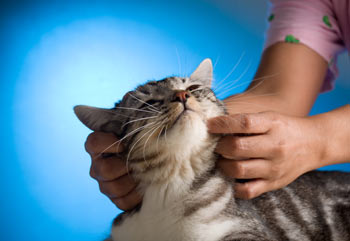Alternative and Holistic Veterinary Medicine for Cats

Alternative and holistic therapies are becoming more widely used by people in the United States. This interest is also extending into cat care. But are alternative treatments safe for cats?
Alternative Medicine in Cats
There are many types of treatments included in the fields of complementary and alternative medicine. These include:
- Acupuncture, acutherapy
- Chiropractic manipulation
- Homeopathy
- Nutraceutical therapy, supplements, vitamins, trace minerals
- Botanical medicine (herbal medicine)
- Traditional Chinese medicine (TCM)
- Flower essence therapy (Bach flower remedies)
- Aromatherapy
- Massage therapy
- Magnetic therapy
- Applied kinesiology (physiotherapy)
- Bio-energetic therapy (Reiki, Tellington TTouch Therapy)
Of these, acupuncture and chiropractic therapies are probably the most widely prescribed in cats, though our understanding of how they work is still the subject of active research.
Physiotherapy has become much more widely applied in the last few years, and its benefits and underlying mechanisms of action are fairly well-understood.
Many of the above-listed therapy models can be used in combination with conventional western medicine to obtain optimal results. It is important to find a practitioner who is comfortable with, qualified for, and knowledgeable about the chosen technique if you elect to use alternative therapies for your cat.
Holistic Medicine in Cats
A holistic practitioner approaches the cat as a whole and evaluates the entire situation when treating the animal and his disease process. Diet, environment, exercise, stress, signs of illness, and other individual issues are all considered. The practitioner may treat the cat using a combination of the alternative therapies listed above and conventional western medicine. The goal of holistic practice is to detect and prevent disease and enhance wellness, not just fight disease.
The therapies described in this article should be administered by a qualified veterinarian or, in some instances, under the guidance of a licensed vet familiar with the modality (system). Explanation of the nature of the therapy and expected outcomes should be understood before treatment begins. Some of these techniques are not supported by scientific studies and are sometimes divergent from American Veterinary School curricula.
Let's take a brief look at some of these alternative and complementary practices.
Acupuncture for Cats
Veterinary acupuncture has been used in China for over 3,500 years. It is the stimulation of specific points on the surface of the body (superficial muscles and skin), most commonly done by inserting thin, sterilized stainless steel needles into the spots. Acupuncture points can also be stimulated by heating the point (moxibustion), using electrical impulses (electroacupuncture), injecting a solution (aquapuncture), or by using a low-power laser.
Acupuncture works primarily through the central nervous system and affects other aspects of the body including the hormonal, musculoskeletal, and cardiovascular systems. It relieves pain and improves the function of these systems. According to Chinese philosophy, acupuncture balances the vital energy (called "Qi"), of the body, helping it to heal itself.
Acupuncture may be useful in the treatment of a wide variety of disorders. These include:
- Gastrointestinal conditions
- Respiratory problems
- Allergies
- Arthritis
- Musculoskeletal disorders
- Chronic pain from injuries
- Skin diseases
- Diseases of the nervous system
Dr. Allen Schoen, D.V.M., M.S., a world-renowned veterinary practitioner who is skilled in veterinary alternative medicine, has used acupuncture with success for the treatment of cats with chronic cystitis (inflammation of the bladder) and bladder dysfunction secondary to nerve damage from trauma as well.
Veterinary acupuncture is not a cure-all, but it works well when used either alone or in combination with conventional medicine. Discuss this modality with your primary veterinarian. He or she can refer you to a qualified acupuncturist, who must be a licensed veterinarian and should have completed formal training in veterinary acupuncture. The following websites can help you locate a veterinary acupuncturist: www.ivas.org and www.aava.org
Chiropractic or Spinal Manipulative Therapy for Cats
Veterinary chiropractic, or spinal manipulation therapy, is the intentional movement of joints to correct spinal alignment and return the body to its normal, healthy state. Exactly how it works is still unclear, but it helps stimulate receptors in the nervous system, changing nerve impulses in the spinal cord, inhibiting pain pathways, and restoring proper function of the nervous system.
A chiropractic adjustment is a short, sudden manipulation, usually done with the practitioner's hands. The American Veterinary Chiropractic Association (AVCA) is a certifying agent for doctors who have successfully completed extensive chiropractic training. They are Doctors of Chiropractic (DC) or Doctors of Veterinary Medicine (DVM). Before you seek chiropractic therapy for your cat, you should consult with your veterinarian for a complete workup and referral. Most state laws dictate that non-veterinarians must work under the supervision of a licensed veterinarian in order to treat your cat with chiropractic therapy. Conventional western medicine is often combined with chiropractic therapy for best results.
Some feline conditions that may be improved by chiropractic therapy include:
- Arthritis
- Painful joints
- Neck pain
- Muscle spasms
- Pain from injuries or trauma
Some metabolic dysfunctions may also be aided by chiropractic therapy.
Homeopathy for Cats
Homeopathy is a complex mode of therapy. It was founded over 200 years ago (in about the year
The signs of the sick animals are matched to the remedy or remedies. When given to the sick animal, they are purported to stimulate the body's natural defenses so the body works harder to heal itself and get well. The homeopath carefully monitors the patient's progress. The remedies are made from plants, minerals, and animal substances. The most effective remedy is one with proven effects that are most like your sick cat's signs.
Homeopathy may be used to treat acute and chronic diseases in cats such as:
- Allergies
- Skin conditions including feline psychogenic alopecia (baldness)
- Gastrointestinal problems
- Cancer
- Respiratory system problems such as feline asthma
Much more research is needed on homeopathy in cats. Only licensed veterinarians can practice it. Consult with your veterinarian in order to obtain additional information about a referral to a homeopathic veterinarian.
Nutritional Therapy, Supplements, and Vitamins for Cats
Many medical problems in cats can be improved with proper nutrition, nutritional supplements, and vitamins. Some holistic practitioners recommend a natural, balanced, homemade diet. Proper diet and natural supplements can support the immune system and help treat your cat's food allergies, chronic renal disease, arthritis, chronic skin disease, chronic infections, heart disease, and more. Good nutrition and natural supplements can also help support your cat while he's undergoing treatment for cancer. The vitamins and supplements are numerous, but include vitamins A, E, and C, glucosamine, chondroitin, bioflavonoid antioxidants, and coenzyme Q10. Certain minerals are also very helpful. Consult with your veterinarian or a holistic veterinarian to learn more about using these therapies properly.
A homemade diet should never be used without the direct supervision of a veterinarian.
Botanical Medicine (Herbals) for Cats
There are several concerns expressed about using herbs in cats, including variability in their quality and source, varying percentage of active ingredients, pesticide contamination, and drug interactions. Definitive dosages for herbal supplements are not known for cats. Also, cats often have serious reactions to medications that other species routinely tolerate, and some herbs may be toxic in cats.
Herbs may be helpful in the treatment of heart and circulatory problems, muscle, bone, and joint conditions, behavior problems, digestive conditions, skin diseases, and immune system problems. Before using any herbal product for your cat, make sure to consult with a qualified holistic veterinarian or a conventional veterinarian educated in botanical medicine.
Bach Flower Remedies for Cats
In the early 1900's, Dr. Edward Bach, an English physician, identified 38 English flower essences. He believed that the essence ("vital force"), or energy, of different flowers would help balance the vital force of his patients and aid in the healing process by improving their emotional state and immune system response.
Currently, no adequate research studies have been completed to document the mechanism of action, effects, or success rate of these essences. Only anecdotal reports of possible successes are published. These are not homeopathic, herbal, or aromatic in preparation. However, Dr. Allen Schoen has seen success in his practice with the use of Rescue Remedy or Trauma Remedy. He reports that animals are calmer and less afraid when the product is used in stressful situations. Be sure to consult with your veterinarian prior to using flower essence therapy on your cat.
Essential Oil Treatment for Cats
The use of essential oils is increasing dramatically in popularity. People who find that the oils help them often wonder if they might also be used to help their cat. It is important to be extremely careful with essential oils around cats because they are quite concentrated, and cats are sensitive to many compounds. Cat deaths have been documented in connection with the use of essential oils. More targeted research is necessary in order to safely use these oils in cats. Collaboration with a veterinarian who is experienced in essential oils and cats is imperative before attempting any treatment with them.
Other Treatment Types for Cats
Many other modalities of alternative and complementary medicines are becoming popular. Research needs to continue so more therapies can be recommended and used safely. Combining the best of alternative and complementary medicine with conventional treatments may be an excellent option for your cat's health care. Be sure to consult with your veterinarian for a referral to a practitioner trained in alternative and complementary medicine.
You May Also Like These Articles:
Feliway - A Useful Tool to Help Treat Stress in Cats
How to Be Prepared for Your Cat's Veterinary Bills
Pet Insurance: Peace of Mind for Your Cat's Health
Subcutaneous Fluid Therapy: Giving Your Cat Fluids at Home
Notice: Ask-a-Vet is an affiliated service for those who wish to speak with a veterinary professional about their pet's specific condition. Initially, a bot will ask questions to determine the general nature of your concern. Then, you will be transferred to a human. There is a charge for the service if you choose to connect to a veterinarian. Ask-a-Vet is not manned by the staff or owners of CatHealth.com, and the advice given should not delay or replace a visit to your veterinarian.






